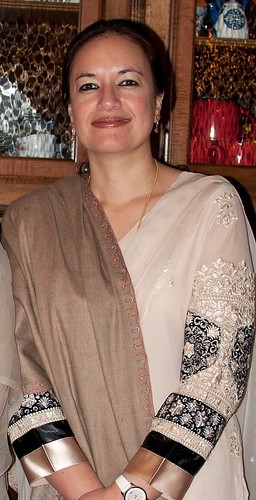by ASHLEY GIBSON
 Dr. Nyla Ali Khan, the granddaughter of Kashmiri leader Sheikh Abdullah. PHOTO/Google
Dr. Nyla Ali Khan, the granddaughter of Kashmiri leader Sheikh Abdullah. PHOTO/Google
Nyla Ali Khan knows well the power of her pen. The writings of this University of Oklahoma professor and granddaughter of a former Kashmiri prime minister are making headlines in both India and Pakistan.
Khan’s extensive family history, particularly the portion pertaining to the leadership of her late grandfather Sheikh Mohammad Abdullah, has been at the center of South Asia’s political debates for decades. Now, after spending years on her own academic quest to discover the truth of her grandfather’s ideals, Khan, a noted scholar and author on Kashmiri culture and politics, is addressing her grandfather’s critics through excerpts from her books that are being published by some of India’s and Pakistan’s major newspapers.
“Propaganda machines of states and militant groups can be so strong that they can erase history without us realizing how our history is slowly and gradually being done away with,” said Khan, an adjunct associate professor in OU’s Women’s and Gender Studies Department. “What I find very interesting is that the younger generation- because of the propaganda of militant groups, the propaganda of the Indian state as well as the Pakistani state- don’t know enough about this man who was a Kashmiri nationalist first and foremost, the man who gave the people of that place a sense of identity. He laid the foundation of resistance politics in Kashmir and of the notion of fighting for self-determination.”
In 1947, India gained its independence from British rule and partitioned into India and Pakistan. The state of Jammu and Kashmir, which lies roughly north of both countries, acceded to India. The accession occurred after tribal invaders from Pakistan attacked Kashmir, causing its monarch to seek military support from India. The Indian government agreed to provide aid to Kashmir under the condition of accession, Khan said.
However, it was understood that once the warring subsided, a plebiscite would be held under United Nations auspices that would give the Kashmiri people the right to decide whether to stay with India or accede to Pakistan, Khan said. Some Kashmiris felt an option for independence should also be added to the discussion since Kashmir had been autonomous before the invasion.
In 1948, Khan’s grandfather, Sheikh Mohammad Abdullah, became prime minister of Kashmir, and by 1953 Abdullah, who was a strong advocate for Kashmiri independence, began to openly question whether the Indian government would organize the plebiscite since efforts had not been made to do so, and still have not to date. Even though he took a peaceful approach, his display of skepticism-coupled with his ideas of an independent Kashmir-and the popularity it gained by others who shared his views, is what caused Abdullah to be deposed and imprisoned by the Indian government for the next 22 years, Khan said.
“It was like everyone was happy with the status quo, and he questioned that. And, he could see that the autonomy of Kashmir was being eroded slowly and steadily,” Khan, 41, said. “Slowly and steadily it was being integrated into the Indian union, which he thought was highly questionable.”
LOOK AT okc for more
